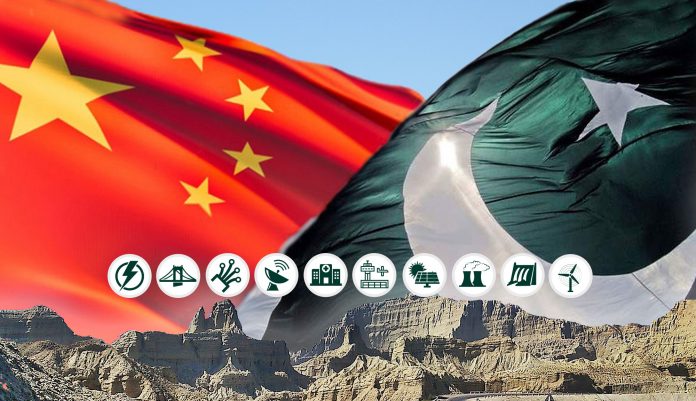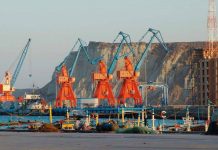
ISLAMABAD: Five years after its launch, the China-Pakistan Economic Corridor (CPEC) has achieved magnificent results that help lay a solid infrastructure foundation for Pakistan’s economic development.
Under the long-term and systematic framework of CPEC, several projects in areas of energy, transportation infrastructure and port construction have been completed.
The unprecedented CPEC projects are changing Pakistan’s business and economic landscape and facilitating them with basic requirements, which has helped the country improve its international credibility and increase its economic growth rate to 5.8 percent in fiscal 2018 from the previous year’s 3.8 percent, according to official figures.
Former Prime Minister Shahid Khaqan Abbasi, who recently concluded his tenure, said last month that CPEC and cooperation with China have helped Pakistan emerge as a rising economy in the world.
The project under CPEC would accelerate economic development and further link Pakistan with China, Central Asia and other parts of the world, said Abbasi.
A couple of years ago, Pakistan was facing severe power shortage with a power cut of up to 20 hours a day. The unsolved power crises prevailing for years was causing an unrest among the public and casting negative effects on the country’s industries and other economic activities.
Pakistan’s Ministry of Energy said that the completed CPEC power projects have brought a great change in the energy sector by bringing the power cut hours to zero form 12-14 hours a day in 70 percent of the country.
Two coal-fired power projects equipped with the latest state-of-the-art environment-friendly technology — the 1,320-megawatt Sahiwal coal-fired power project in the country’s Punjab and the Port Qasim coal-fired power plant with the same capacity in southern port city Karachi — have already started production.
The two projects are expected to generate 18 billion kWh of electricity together annually, which can cater for the needs of eight million local families.
The CPEC power projects not only have eased daily lives of Pakistanis but are also creating hundreds of thousands of jobs by helping restart the industries that were closed due to power shortage.
Besides the coal-fired power plants, CPEC also provides new energy to Pakistan so as to diversify the country’s energy sources to maintain its energy security. Part of the Quaid-e-Azam Solar Park is functional and three wind power farms are also supplying electricity in southern Sindh province, while two such projects will also start their commercial operations later this year.
Pakistan’s Ministry of Planning, Development and Reforms said that energy projects under CPEC will double the energy-thirsty country’s current capacity of electricity production after their completion.
Yasir Rehman, an anchor from the official Pakistan Television, said that the developed infrastructure under CPEC is bringing stimulus to the Pakistani economy, creating jobs and improving business by starting a constructive process.
“Uninterrupted power supply is helping industries increase production, creating an ideal atmosphere for Pakistan’s economy,” said Rehman, adding that with the functionalized Gwadar port, CPEC will benefit every common Pakistani.
Gwadar, the ending point of CPEC, which was once an ignored small sluggish fishing town located at the Arabian Sea in Pakistan’s southwest Balochistan Province, is now witnessing a wave of development projects which are creating new opportunities for employment and business.
Gwadar port, with the fully functional port terminal, regular cargo service, free zone, business centre, is a symbol of future development and prosperity of Pakistan.
According to China Overseas Ports Holding Company (COPHC), the port’s operator, some 20 companies in different businesses have already joined the Gwadar free zone with direct investment of 3 billion Chinese yuan (over 460 million U.S. dollars).
Gwadar’s local people are feeling the development impetus triggered by the rapidly developing port, construction of new roads, establishment and upgrading of educational institutions and hospitals, construction of a new international airport and installation of water purification plants.
Thousands of people, from labourers to businessmen, have migrated from across the country to Gwadar to grab emerging opportunities for business and employment since the launch of CPEC.
In the meantime, CPEC has also brought major improvements and overhauls to Pakistan’s transportation infrastructure by upgrading and reconstructing already existing roads and building new superhighways.
Several transportation projects under CPEC are forming a road network in the country to improve Pakistan’s internal connectivity as well as with the rest of the world.
On May 26, Abbasi inaugurated the first section of the 392-km Multan-Sukkur Motorway, the largest transportation infrastructure project under the CPEC in Multan of Punjab.
The motorway is expected to cut the travel time between Multan and Sukkur from 10 hours to four hours at the maximum designed speed of 120 km per hour. It will also facilitate travelling in areas located alongside it.
Mumtaz Hussain, a local farmer, told Xinhua that the CPEC motorway had given a new hope of prosperity to his family because now they can easily travel to cities to sell their vegetables at a better rate.
The motorway is a symbol of close cooperation between Pakistan and China, said Abbasi, adding that CPEC is the implementation of Chinese vision of connectivity and opening up under the Belt and Road Initiative that is bringing great economic opportunities to Pakistan and the region.
According to Chinese Ambassador to Pakistan Yao Jing, Chinese companies under CPEC projects have provided over 100,000 jobs to local people and have helped to uplift their living standards through social welfare works, including restoring and establishing schools and technical training centres, providing health facilities, and sending hundreds of youngsters to China for further study.
Former Minister for Planning, Development and Reform Ahsan Iqbal hailed CPEC as it has brought actual positive changes in the lives of millions of Pakistanis.
“CPEC is a national agenda and has been put into implementation in record time due to the solid commitment of both Pakistani and Chinese leadership,” said Iqbal.
Courtesy: Xinhua News Agency







Counting chickens before they are hatched. Till such time the brainless morons, a majority in Pakistan’s electorate come to their senses and elect decent and honest people, there will be no change in Pakistan despite CPEC. It is this electorate of SHEEPLE that is keeping Pakistan poor and backward, mercilessly looted, plundered and raped by crooks, thieves and money launderers. time and again they have been elected by brain dead morons.
what the
f
Comments are closed.